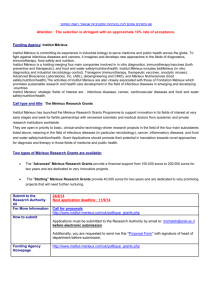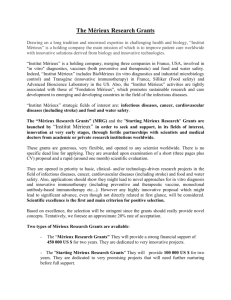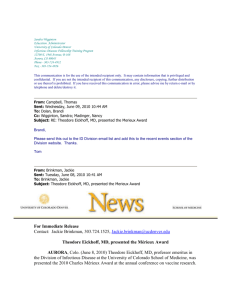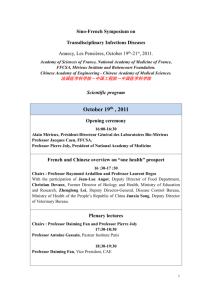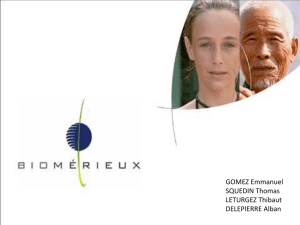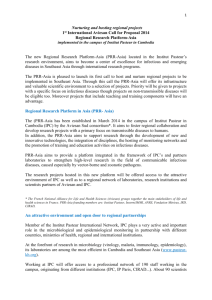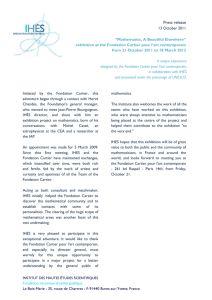Présentation PowerPoint
advertisement
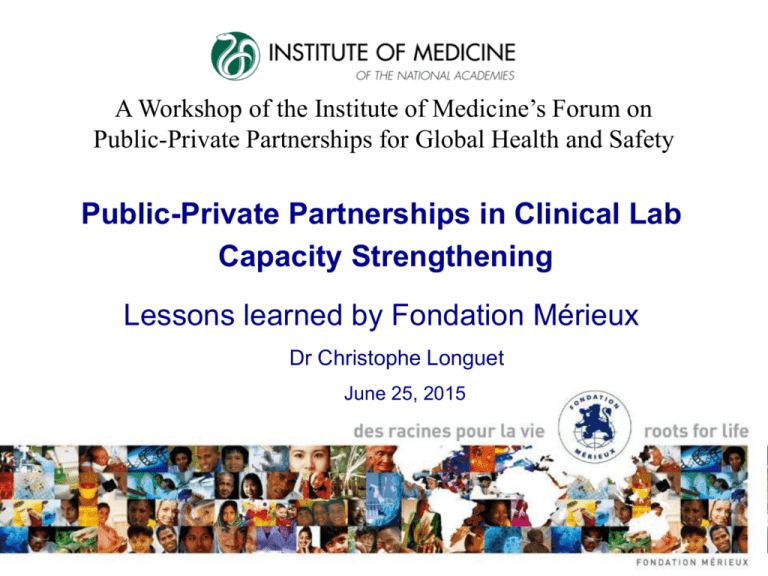
A Workshop of the Institute of Medicine’s Forum on Public-Private Partnerships for Global Health and Safety Public-Private Partnerships in Clinical Lab Capacity Strengthening Lessons learned by Fondation Mérieux Dr Christophe Longuet June 25, 2015 A Family Foundation Serving Public Health • Created in 1967 by Dr Charles Mérieux in homage to his father Marcel Mérieux who worked on vaccines and serotherapy with Louis Pasteur • Official public interest status in 1976 1897: Marcel Mérieux founds Institut Mérieux after working with Louis Pasteur 1975: Dr. Charles Mérieux, 103 million meningitis vaccines for Brazil Today: Alain and Alexandre Mérieux Mission of Fondation Mérieux Strengthen local capacities in developing countries to reduce the impact of infectious diseases on vulnerable populations Fondation Mérieux works in symbiosis with Fondation Christophe et Rodolphe Mérieux, a family foundation, under the auspices of the Institut de France Fondation Mérieux - Institut Mérieux FONDATION MÉRIEUX INSTITUT MÉRIEUX FONDATION CHRISTOPHE ET RODOLPHE MÉRIEUX 32 % ALAIN & ALEXANDRE MÉRIEUX COMPAGNIE MÉRIEUX ALLIANCE 100 % FONDATION MÉRIEUX USA 82 % FOOD SAFETY 68 % 100 % 59 % DIAGNOSTICS 55 % IMMUNOTHERAPY Current Strategy Focus 1: Strengthen local applied research capacities for more accurate and timely identification of infectious diseases Focus 2: Improve the quality and accessibility of biological diagnosis for vulnerable populations to ensure appropriate care Focus 3: Promote exchange among public health stakeholders to share and enhance knowledge on infectious diseases and foster innovation Main Funding Partners • • • • • • • • • • • • • • • • Agence Française de Développement (AFD) Armed Forces Health Surveillance Center / GEIS Bill & Melinda Gates Foundation CDC Foundation European Union Fondation Christophe et Rodolphe Mérieux French Ministry of Foreign Affairs / Initiative 5% Fonds Mondial International Cooperation of Monaco Islamic Development Bank NAMRU-2 Novartis Vaccines Région Rhône-Alpes Sanofi Pasteur / Sanofi Pasteur MSD Stavros Niarchos Foundation United Nations Development Program (UNDP) World Bank (via West African Health Organization WAHO) Main Operational Partners • • • • • • • • • • • • • • • Catholic University Lyon (France) Child Health Foundation (Bangladesh) FioCruz (Brazil) GHESKIO Centers (Haïti) Institut Pasteur Institute of Pathogen Biology of the Chinese Academy of Medical Sciences (China) KEMRI-CDC (Kenya) London School of Hygiene and Tropical Medicine (LSHTM) Malaria Research and Training Center Ministries of health of all collaborating countries National Public Health Laboratory, LNSP (Haiti) Saint Joseph University (Lebanon) University of Health Sciences Phnom Penh (Cambodia) West African Health Organization (WAHO) WHO GLOBAL PRESENCE LEBANON Rodolphe Mérieux Laboratory in Beirut FRANCE Fondation Mérieux Headquarters Emerging Pathogens Laboratory Les Pensières UNITED STATES CHINA Christophe Mérieux Laboratory in Beijing TAJIKISTAN National Public Health Reference Laboratory in Duchanbe BANGLADESH IRAQ Fondation Mérieux USA Rodolphe Mérieux Laboratory in Chittagong Registration of Fondation Mérieux LAOS SENEGAL Rodolphe Mérieux Laboratory in Vientiane RESAOLAB Laboratories HAITI CAMBODIA Rodolphe Mérieux Laboratory in Port au Prince Rodolphe Mérieux Laboratory in Phnom Penh MALI BRAZIL Rodolphe Mérieux Laboratory in Bamako RESAOLAB Laboratories Rodolphe Mérieux Laboratory in Rio Branco (underway) Local Fondation Mérieux Office MADAGASCAR Rodolphe Mérieux Laboratory in Antananarivo ALGERIA WEST AFRICAN NETWORK OF LABORATORIES Improve the quality of laboratory services for patient care and disease surveillance WESTERN SAHARA MAURITANIA MALI NIGER Niamey Dakar Bamako SENEGAL BURKINA FASO GAMBIA GUINEABISSAU GUINEA Conakry BENIN Ouagadougou SIERRA LEONE NIGERIA LIBERIA IVORY COAST TOGO GHANA CAMEROON Lomé Porto-Novo Partners: French Development Agency (AFD) International Cooperation of Monaco, Islamic Development Bank, Stavros Niarchos Foundation, West African Health Organization, ministries of health Achievements • • • • • Governance: 1 international steering committee and 7 national steering committees About 500 public and private laboratories 12 training centers (4 in each country) operational at national and regional levels in Burkina Faso, Mali and Senegal National plans for Continuous Education and for Laboratory Quality Assurance validated in these three countries 8 training modules developed and delivered by more than 45 trainers in over 100 training sessions organized for lab workers • Harmonized grids for field supervisions developed and 182 onsite supervisions/External Quality Control implemented • Development of a Laboratory Information and Management System LIMS currently being deployed in the network of laboratories • Extension in all ECOWAS countries of the training component through WARDS(West African Regional Disease Surveillance Capacity Strengthening Project) supported by the World Bank • Involvement of RESAOLAB against The West African Ebola epidemic Against Ebola • Training in biosecurity and hemorrhagic fevers o More than 500 laboratory professionals trained in 7 countries E-learning module accessible online to lab technicians throughout Africa Secure systems for referring specimens to BSL4 Jean Mérieux – Inserm Lab in Lyon o • o Safe system for transporting specimens established with RESAOLAB member countries, Institut Pasteur and Inserm: +500 boxes sent to 7 countries (+2) • 2,500 personal protection equipments provided to Guinea, covering all labs in the country Mobile biosafety lab set up in Mali • Collaboration with the GIZ and Charles Mérieux infectiology center of Bamako Expert missions in Guinea and Sierra Leone o o Lessons learned • Build the project with your local partners not for them • • Understand each other’s perspective Catalyze the actions and give ownership in implementation • Develop clear agreements and be flexible • Learn from your partners Thank you
